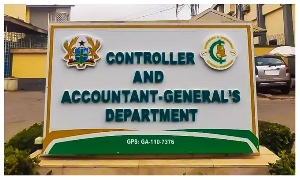General News of Wednesday, 20 June 2018
Source: ghananewsagency.org
Symposium on climate and environmental research opens in Accra
A science symposium has opened in Accra, to create a platform for advancing discussions on the contribution of climate and environmental services, to reduce the negative impacts of climate change on socio-ecological systems in West Africa.
The three-day programme which is being hosted by the West African Science Service Centre on Climate Change and Adapted Land Use (WASCAL), is on the theme “Climate and Environmental Services to Reduce Vulnerability and Improve Livelihoods in West Africa: From Theory to Actions”.
It aims at showcasing WASCAL’s major achievements and to launch the new research and action plan for 2018 to 2022, termed as the “WASCAL Research and Action Plan (WRAP 2.0)”.
Dr Moumini Savadogo, the Executive Director of WASCAL, at the opening ceremony on Tuesday, said the platform provided research institutions, universities, NGOs, government agencies and enterprises from across West Africa with an opportunity to display and present their works in the field of climate change and environmental issues.
It further set the stage for participants to network and explore possibilities for collaboration, foster information exchange and to discuss methodological approaches and experiences derived from case studies and projects.
He explained that as a research capacity building and climate services centre, WASCAL believed in pursuing science-based solutions to climate-related challenges in the sub-region.
Consequently, its previous and current activities had centred on an unrivalled instrumentation to close the data gaps in climate change research in West Africa, training the next generation of climate scientists through an ambitious capacity building programme.
Dr Savadogo said WASCAL has since its establishment eight years ago, been pursuing the implementation of cutting edge research on various aspects of climate change research, and has made some modest achievements which included; the improvement in the quality and quantity of critical data required for climate change research.
It has also promoted the science-based solutions to the current challenges being faced through the implementation of human centred projects, and delivered climate and environmental services for reduced vulnerability to “Climate Change and Climate Vulnerability” , as well as livelihood improvement in the sub-region.
Dr Savadogo said in terms of capacity building, WASCAL Doctoral and Master Programmes had been implemented in 10 lead Universities across nine West African countries, and would soon be increased to 12 in 11 countries, with 10 topics related to climate change.
In addition, WASCAL has purchased and installed Automatic weather stations across all its 10 member-countries in tied collaboration with the national meteorological agencies, with the aim of closing the climate change data gaps in the sub-region, while strengthening these agencies, he said.
He said the occasion would be used to share highlights of the WASCAL’s Second Research and Action Plan (WRAP2.0), which was developed after an extensive and all-inclusive stakeholder consultative process.
He acknowledged effective partnerships as the only way to sustainably combat climate change and improve livelihoods, and thanked all WASCAL partners and donors for the good collaboration and support.
Mrs Patricia Appiagyei, the Deputy Minister of Environment, Science, Technology and Innovation, underscored the importance to rethink collaboration rather than engaging in unhealthy competition.
She urged the meeting to come up with achievable strategies that would benefit local communities, while ensuring effective interaction with policy makers and parliamentarians to keep them abreast with climate change impacts.
The Deputy Minister pledged the government’s support and collaboration to WASCAL’s programmes and activities, applauding the Organisation for all the modest achievements, and for particularly deploying the use of state-of-the-art strategies to close the climate change data gaps.
She also acknowledged the tremendous support in the area of science research capacity building, and for providing climate change services to vulnerable groups including smallholder farmers.
Mrs Appiagyei however spoke about the uncertainty in the current weather patterns, resulting from the adverse effects of climate change, saying this was a major challenge to the growth in agriculture and economic development.
She said although a lot was being done in terms of investments, to mitigate the negative climate change impacts, there was still more to be done, and called for the mobilisation of resources to sustainably achieve the desired results.
She urged the conveners of the symposium to endeavour to integrate the outcomes into regional adaptations.
Mr Christoph Retzlaff, the German Ambassador to Ghana, welcomed the collaborative efforts of WASCAL towards climate change adaptation and mitigation through effective scientific research, saying the German government was providing 250 million Euros to support this course to build resilient approaches.
Professor Rene Haak, a Representative of the Federal Ministry of Education and Research, Germany, underscored the importance of strengthening the science research base in Africa, acknowledging the efforts of WASCAL in coordinating several of these studies.
He said so far WASCAL had trained 280 climate change researchers, but the number would be increased to a 1,000 students in the next batch, and would ensure that the training were translated into key outcomes that would address the concerns of society.
He also pledged his personal commitment to support WASCAL’s programmes.
Mr Bougonou Kouassivi Djeri-Alassani, the Representative from the ECOWAS Agriculture, Environment and Water Resources, also acknowledged the efforts of WASCAL towards improving climate change data, and asked that the outcomes were shared with all ECOWAS members, to help sustain the relevance of the Organisation.












